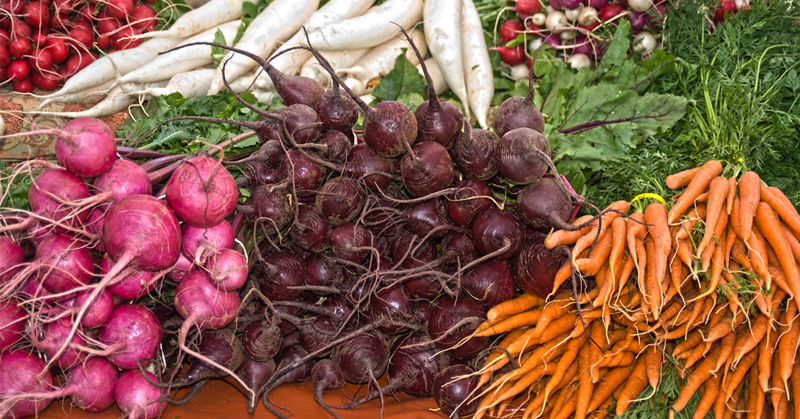From their high-fiber content to their many nutrients, root vegetables boast a great deal of fantastic health benefits. And they have long history of medicinal and dietary use. For example, they have long been an important ingredient in folk medicine. Additionally, they’ve been a staple in several South American and Asian diets for thousands of years.
Whether they’re used in stews, juices, are roasted or, in some cases, eaten raw, root vegetables are extremely versatile. They’ve also supported undernourished populations worldwide, and it’s easy to see why, as the health benefits of root vegetables are many. Read below to learn more about this nutritionally-dense family of vegetables.
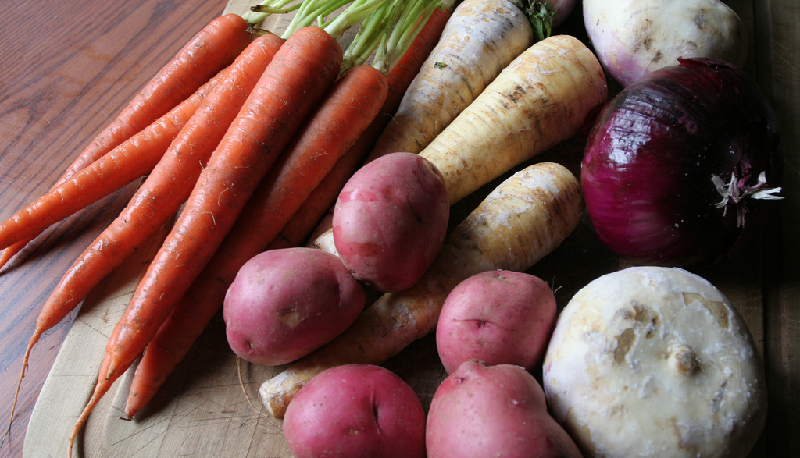
Here are 8 benefits of root vegetables:
1. Provide Complex Carbs and Starch
One of the most common benefits of root vegetables is the provision of complex carbohydrates and starch. It’s true that the average person consumed more carbs than needed. However, consuming the right amount of carbohydrates will help you to feel your best. Furthermore, starchy root vegetables are full of fiber as well as nutrients, all with a small amount of sugar. The good news there is that starchy veggies can actually help you satisfy a sweet tooth without filling your body with too much sugar.
2. High in Fiber
Next on the list of benefits of root vegetables is the high amount of fiber. In fact, due to the fiber, they are considered low glycemic index foods, despite their sugar content. (1)
The fiber root vegetables contain also has polysaccharides, which exhibit several biological activities. This includes anticarcinogenic, anticoagulant, immune-stimulating and antioxidant effects. Diets high in fiber also help with digestive, relieving constipation, and preventing IBS. (2)
Benefits of root vegetables also include being slow-burning carbs, meaning they won’t spike your blood sugar. In fact, according to the Europpean Journal of Clinical Nutrition, a higher intake of root vegetables is linked with a lowered risk for diabetes. (3)
3. Good Source of Vitamins A and C
Additionally, benefits of root vegetables include the ability to fight inflammation. This is due to the carotenoid antioxidants these veggies contain, such as vitamins A and C. Beta-carotene, which is a precursor to active vitamin A, can be found in large amounts in sweet potatoes, carrots, beets and other root veggies. (4)
4. Can Help You Lose Weight
Increasing your fiber intake can help you on the weight loss journey. And, unlike grains, many root vegetables are lower in calories as well as lower on the glycemic index. Furthermore, the fiber in these veggies can help you stay fuller longer, which in turn can help you stay on track when you’re trying to lose weight.
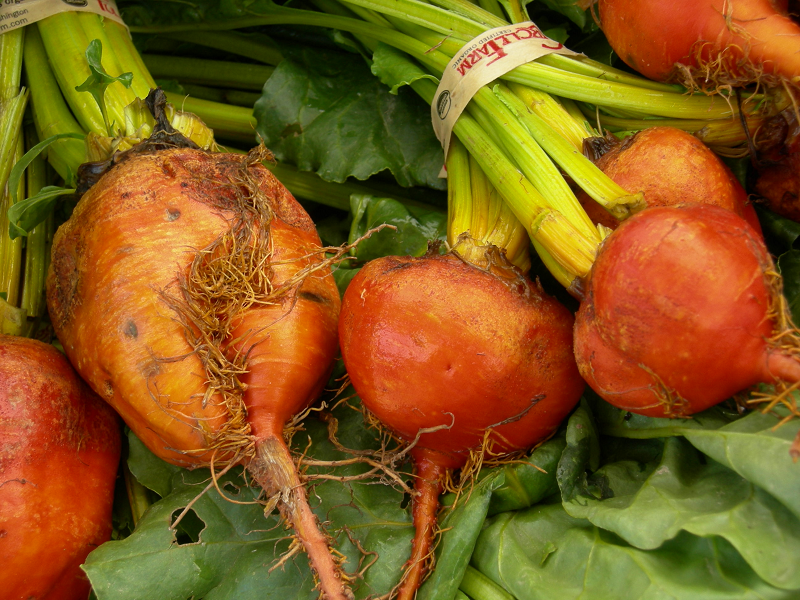
5. Help Maintain Healthy Skin and Eyes
Benefits of root vegetables also include promoting healthy skin. The beta-carotene and vitamin C these veggies contain can help build and defend skin cells. Furthermore, beta-carotene can help reverse free radical damage, which is often the culprit behind age-related eye disorders, like macular degeneration and cataracts. It’s also what leads to sun spots, wrinkles, UV damage, and even skin cancer.
6. Contain Anticancer Antioxidants
Almost all root vegetables contain antioxidants such as lutein and zeaxanthin. Furthermore, purple sweet potatoes contain anthocyanins, which can stop oxidative damage as well as brain degeneration.
7. Help Lower Cholesterol and Improve Heart Health
A diet high in fiber that contains both soluble and insoluble fibers is important for heart health. This is where benefits of root vegetables come into play again. Their fiber content can help lower cholesterol, which helps protect your body from a buildup of plague. This in turn lowers risk for heart disease, heart attacks and stroke.
Furthermore, if you struggle with low potassium, consider adding more root vegetables into your diet. They keep your heart healthy with their high amount of potassium. This is beneficial for healthy blood pressure, nerve signaling as well as fluid balance.
8. Help Fight Cancer and Cognitive Disorders
Benefits of root vegetables include fighting cancer. This is due to the anti-inflammatory properties of these veggies, such as vitamins A and C, which can act like natural cancer treatments.
Furthermore, benefits of root vegetables include fighting cognitive disorders. This is because reduced levels of inflammation are associated with a reduced risk of Alzheimer’s disease, dementia and Parkinson’s disease.
Now that you know the various ways in which root vegetables can benefit your health, which ones do you choose? Below is a list of the 10 healthiest root vegetables. Try cycling through them to see which ones are your favorites!
10 Healthiest Root Vegetables
1. Sweet Potatoes/Yams
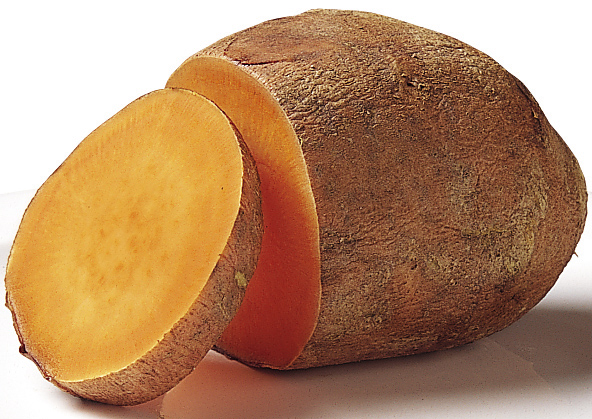
First on the list of healthy root veggies is the sweet potato and the yam. These two are among the most popular choices, due to their taste and versatility. Sweet potatoes are high in vitamin A, and are, in fact, one of the best sources of vitamin A in the world. They’re also high in potassium, vitamin B5 and vitamin C.
Yams contain more potassium than sweet potatoes, but sweet potatoes are lower in calories and contain more antioxidants. Taste wise, they are similar, so either one is a great choice.
2. Russet or Yukon (White) Potatoes
White potatoes can be good for you, depending on how you prepare them. They contain antioxidants and nutrients, including potassium, which is important for bone and heart health. Furthermore, potatoes can help reduce risk for low potassium more so than can bananas and sweet potatoes.
Additonally, white potatoes are a good source of manganese, which is also important for bone as well as nerve health.
To preserve the potassium white potatoes offer, eat the skins and cook them lightly. This means staying away from potatoes that are fried, such as deep-fried French fries. (5)
3. Carrots
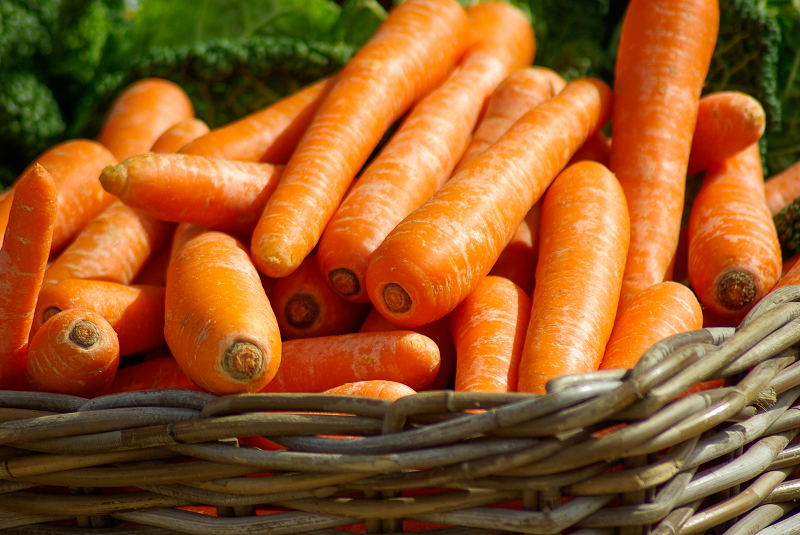
Next on the list of root veggies is carrots, which is one of the most popular vegetables around the world. They can be eaten raw, cooked or juiced. The antioxidants called carotenoids is what gives carrot juice and carrots their trademark orange color, and is what can help protect your eyes and skin. Other carrot nutrients include lutein, zeaxanthin, vitamins A, D, E, and K, as well as magnesium, potassium and calcium.
4. Parsnips
Parsnips are in the same family as parsley and celery, and as such, have many of the same benefits. They provide fiber, folate, potassium, and vitamin C. Half a cup of cooked parsnips gives you about 12 percent of the fiber you need every day.
5. Beets
Some research suggests that beets can enhance your endurance during athletic performance as well as help you recover from exercise more effectively. This is because beets contain nitrates, which your body can use for muscle recovery, improved circulation, and for lowering inflammation. (6)
6. Turnips
Turnips are cruciferous vegetables, and as such, have the cancer-fighting abilities as broccoli, collard greens, cabbage, kale and Brussels sprouts. And like other cruciferous vegetables, turnips contain phytonutrients called indoles that can reduce cancer risk. Turnips are also high in calcium, magnesium and potassium, making them a smart choice for heart health.
7. Rutabaga
The rutabaga is similar to both the cabbage and turnip and offer several of the same benefits as these two. They’re high in fiber and vitamin C, giving you roughly 47 percent of your recommended daily intake. Furthermore, they’re high in zinc, which is promotes immune health, brain function, mood regulation and metabolism. Their taste is similar to turnips and white potatoes and are delicious when roasted or caramelized.
8. Butternut Squash
Butternut squash is not only delicious, but can also fight against cancer and boost your immune system. This is due to its content of beta-carotene. In fact, the darker the hue a vegetable has, the higher amount of beta-carotene it contains. Beta-carotene can help destroy cancer cells by promoting communication between cells that destroy cancer growth. You can roast this root vegetable as well, or use it in baked goods to replace sugar or excess amounts of dairy.
9. Winter Squash

Winter squash provides alpha-carotene, beta-carotene, lutein, zeaxanthin and beta-cryptoxanthin. All of these antioxidants are crucial for eye health. And both winter and butternut squashes have high amounts of starch, which means they have polysaccharides. Polysaccarhides have agents that are antioxidant, anti-inflammatory and antidiabetic properties.
10. Jerusalem Artichokes
Jerusalem artichokes, or sunchokes, offer 10 grams of fiber, three grams of protein, and only 100 calories per serving. Furthermore, the Jerusalem artichoke is a good source of vitamin A, iron and potassium. This veggie is great, therefore, for fighting an iron deficiency and preventing anemia.


